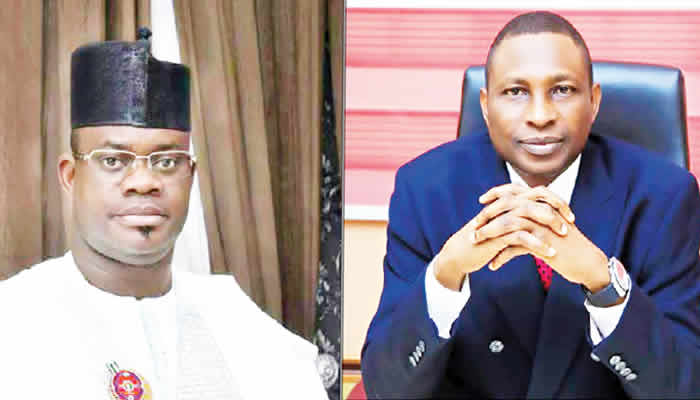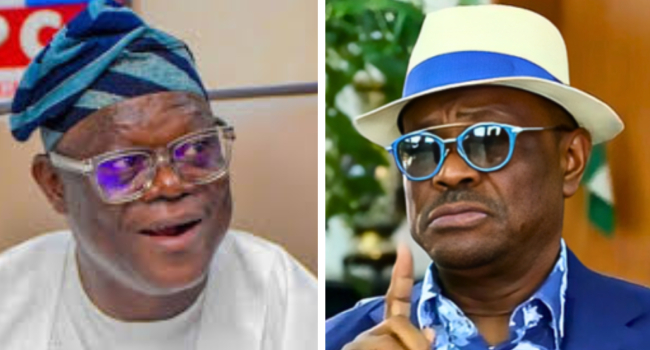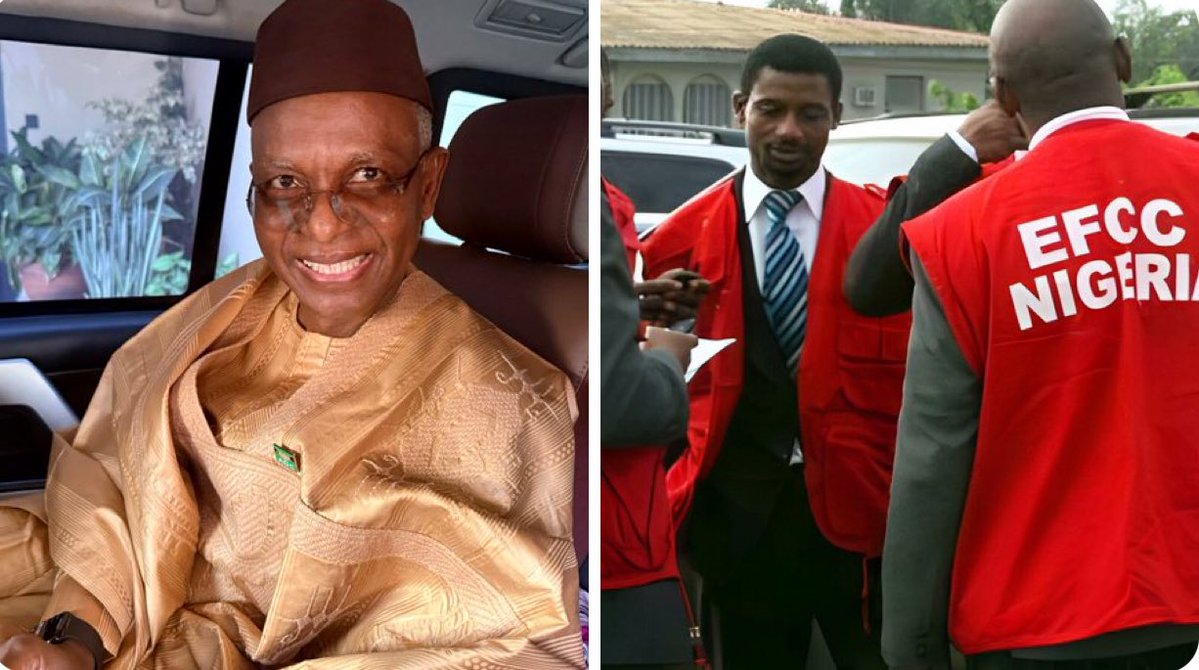By Eric Elezuo
With the declaration of the Apppeal Court, sitting in Abuja over the weekend, ordering a stay of proceedings in the contempt charge instituted by Yahaya Bello, former Kogi governor, against Ola Olukoyede, chairman of the Economic and Financial Crimes Commission (EFCC), the stage seems set for an elongation of legal fireworks between the two feuding entities.
The declaration was a follow-up of Bello, who approached the Kogi High Court, seeking an order to issue and serve the respondent (EFCC chairman) with “form 49 notice” to show cause why an order of committal should not be made on him.
The judge, after listening to the arguments of the applicant’s counsel, the submission and the exhibits attached in the written address, granted Bello’s prayers and ordered Olukoyede to be summoned to appear before the court to answer the contempt charge.
However, while it is believed that the crisis of apprehending the former governor for prosecution is an institutional matter, many on the other hand, has accused the EFCC chairman of attaching a lot of personal interest in the matter going by the way he is fighting tooth and nail to see Bello in custody.
In a chat with editors at the EFCC Headquarters, Jabi, Abuja, the anti-graft agency chairman swore to follow the prosecution of Bello to the logical conclusion.
He also vowed that all those who obstructed the arrest of the former governor would be brought to justice.
The EFCC is seeking to arraign Bello on 19 counts bordering on alleged money laundering, breach of trust and misappropriation of funds to the tune of N80.2 billion.
“If I do not personally oversee the completion of the investigation regarding Yahaya Bello, I will tender my resignation as the EFCC Chairman,” Mr Olukoyede had vowed, adding that those who obstructed the arrest of the former governor would be brought to book. This was a veiled accusation against the governor of Kogi State, Usman Ododo, who used security agents to forestall the arrest of Bello in Abuja.
Olukoyede had also accused Bello of paying his children’s school fees upfront with funds from the atatae coffers.
“A sitting governor moved $720,000 directly from the government account to the Bureau de Change and used it to pay for the school fees of his child in advance in a poor state like Kogi, and you want me close my eyes under the guise that I’m being used. Use by who? At this stage of my life? By who for crying out loud?
“I didn’t initiate the case, I inherited the case file,” he retorted.
The EFCC had sought to arrest Yahaya Bello following his absence from court, and an order by Justice Emeka Nwite of the Federal High Court in Abuja after his absence in court.
He was absent from court for his arraignment on a 19-count charge of alleged money laundering to the tune of ₦80bn.
The judge relied on sections 384(4) and (5) of the Administrative and Criminal Justice Act 2015, directing the counsel to the immediate past governor to receive a copy of the charge.
The court held that where it had become impossible to effect personal service of a legal process on a defendant, such could be done through substituted means.
Justice Nwite further held that it was clear that the former governor failed to appear in court for his arraignment.
Notable minds including veteran journalist, Dele Momodu; human advocate and constitutional lawyer, Mike Ozekhome among others have said that the brazen nature with which Olukoyede is going about the matter smacks of personal vendetta, noting that now that the court of appeal has ordered a stay of execution of the contempt of court charges against Olukoyede, everyone must maintain status quotes, and allow Bello to respond to court summon, as the case is now between him and the court of Justice Nwite.
On his part, Momodu has lashed out at the EFCC for selective prosecution, wondering if Olukoyede has any personal stake in the matter, adding that generally the EFCC misfired in the Bello saga.
He said in part, during his Instagram live show:
“I don’t work for EFCC but from all the things that I have read, a lot of them, they misfired. That is the honest truth. They misfired. They didn’t do their due diligence. When you said a man took out money and paid for his children’s school fees, just as he was about to leave power, and you go and check the documents and you see that these things started happening from 2021, 2022 (laughs); I am not an illiterate.
“How do you expect me to believe everything they said when they were too much in a hurry to prosecute him that they did not take their time to check the file. Once you allow a lacuna in law, everything will fall flat.
“That is it. I am not one of those people who will say because I don’t like APC and because I supported Dino Melaye in the last election in Kogi State. Dino is my guy. But, I will not because of that be blinded by hatred for Yahaya Bello and say yes, he should go and surrender himself to EFCC when there is an existing injunction.
“And he is not the only governor who went to court and if the court has granted him that, so be it. We all know that our judiciary is not so perfect but you know, even at that, law is law, it must be obeyed. If we disobey the rule of law, then, we will have to obey the rule of the jungle. So, I never said that they are lying, it is their own statement that shows that they didn’t do their due diligence.”
TheCable, in its report, recalled that “a Kogi State high court presided over by Isa Jamil Abdullahi, had ordered Olukoyede to appear before it on May 13 to show why he should not be committed to prison for allegedly disobeying its order restraining the EFCC from arresting or taking any action against Bello.
“However, the EFCC chairman filed an appeal against the court summon.
“Olukoyede filed two motions, one seeking a stay of execution of the summon, and another one asking to serve processes on Bello via substituted means by pasting the process at his Abuja residence on No 9 Bengazi Steet Wuse Zone 4.
“In its ruling, a three-member panel of justices led by Joseph Oyewole granted the two motions.
“The appellate court fixed May 20 for the hearing of the substantive appeal marked CA/ABJ/CV/413/2024.
“Bello had on February 8, 2024, instituted a fundamental rights enforcement suit, asking the court to declare that “the incessant harassment, threats of arrest and detention, negative press releases, malicious prosecution” by the EFCC, “without any formal invitation, is politically motivated and interference with his right to liberty, freedom of movement, and fair hearing”.
“The former governor also sought an order “restraining the respondent by themselves, their agents, servants or privies from continuing to harass, threaten to arrest or detain him”.
“On February 9, the Kogi high court granted an interim injunction restraining the EFCC from “continuing to harass, threaten to arrest, detain, prosecute Bello, his former appointees, and his staff or family members, pending the hearing and determination of the substantive originating motion for the enforcement of his fundamental rights”.
On March 12, the EFCC filed an appeal against the interim injunction because the court could not stop the commission from carrying out its statutory responsibility.
The Kogi high court delivered judgment on the substantive motion on notice on April 17 wherein the presiding judge granted an order restraining the EFCC “from continuing to harass, threaten to arrest or detain Bello”.
However, the judge directed the commission to file a charge against Bello before an appropriate court if it had reasons to do so.
The judgment coincided with the recent “siege” laid on the Abuja residence of Bello by EFCC operatives seeking to arrest him.
The commission had also obtained a warrant of arrest against the former governor from the federal high court in Abuja.
The EFCC is seeking to arraign Bello on 19 counts bordering on alleged money laundering, breach of trust and misappropriation of funds to the tune of N80.2 billion.
At the scheduled arraignment on April 18, Bello was absent.
At the court session, Abdulwahab Mohammed, counsel to Bello, told Emeka Nwite, the presiding judge, that the court lacked jurisdiction to grant the warrant of arrest in the first instance.
He referenced the February 9 interim injunction issued by the Kogi high court, adding that the appeal filed by the EFCC was still pending.
However, the EFCC has filed a notice to withdraw the appeal.
In the notice filed on April 22, the anti-graft agency said the withdrawal was predicated on the fact that events have overtaken the appeal.
The commission also admitted that the appeal was filed out of the time allowed by law.
With the present status, legal minds are of the opinion that matters have returned to status quo, and Justice Emeka Nwite, reserved the right to order Bello’s appearance in court, and await his appearance before any other injunction can be made.
“For now, it is not about who won or who did not. The matters of the case rest with the invitation of Bello by Justice Nwite. Bello was absent during his first summon, and the case was adjourned. So, everyone has to keep the calm and wait for the next hearing and see if he appears or not as directly by his lordship,” Ozekhome noted.
As it is therefore, May 20 will be a deciding factor for both Bello and EFCC as the tussle for who laughs last continues.

 News5 days ago
News5 days ago
 Headline5 days ago
Headline5 days ago
 Featured4 days ago
Featured4 days ago
 Featured4 days ago
Featured4 days ago
 Headline6 days ago
Headline6 days ago
 National5 days ago
National5 days ago
 Featured3 days ago
Featured3 days ago
 Featured3 days ago
Featured3 days ago












